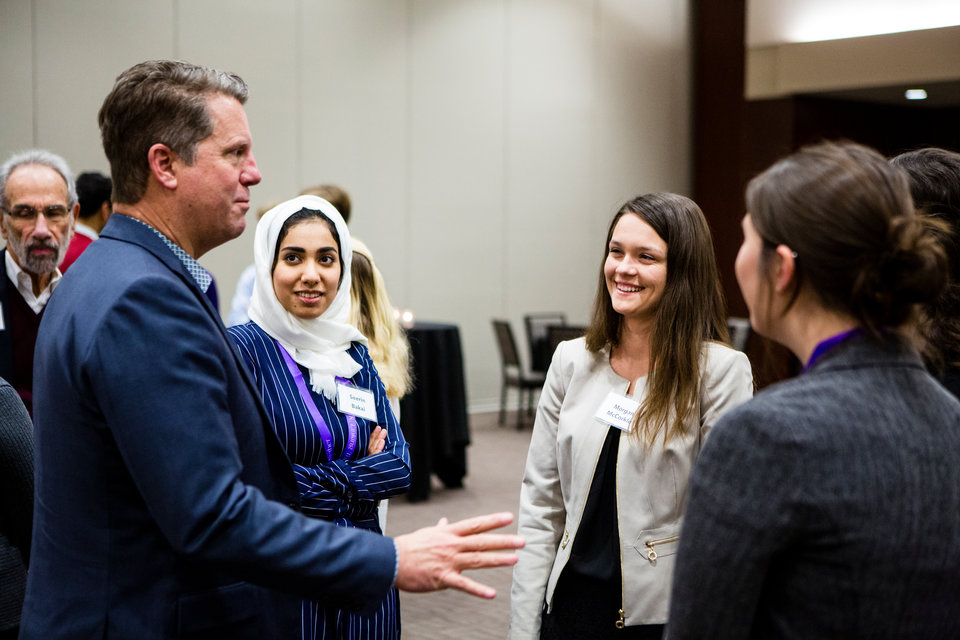Is a liberal arts degree worth it? It's a question that has risen in prominence over the last few years, prompting consideration over what methods of education best prepare students for future workplaces and provide them with the most value for their tuition dollars.
The question was one of many discussed at Envision, a career exploration program sponsored by the Career Development Center, held Jan. 25-26. The sessions focused on helping students discern what careers might fit them and the steps needed to achieve that goal, including networking practice, hearing from alumni and visiting Twin Cities companies.
Throughout, the many strengths of a liberal arts degree were raised. Below is a list of the top reasons a liberal arts degree can help students be successful.
For additional information on how to grow or leverage any of these to their maximum potential, please contact the St. Thomas Career Development Center.
A liberal arts degree is about the process of becoming.
College of Arts and Sciences Dean Yohuru Williams delivered the keynote speech specifically on the value of a liberal arts degree, and this was his primary point. He emphasized that while a liberal arts education does prepare students for careers, it also helps them evolve into a sense of who they are and who they want to be.
"You're learning to be the best you, you can possibly be," Williams said.
A liberal arts degree prompts students to experience and explore many opportunities.
"It exposes you to so much so you can find what you're interested in," Williams pointed out. In addition to the core requirements of one's major, liberal arts students are expected to take classes across several fields, so they complete their degree with a strong foundation.
While the classroom is a major aspect, Williams and many of the industry panelists emphasized there are many other resources at a school such as St. Thomas: mentorships, internships, studying abroad, participating in extracurriculars and networking with alumni. All of these, they pointed out, can help students continue to discern what fields of work they might be interested in while providing skills and knowledge to prepare.
A liberal arts education is timeless ...
Williams pointed out liberal arts education has a long history, and several of the panelists said that was because it left room for students to grow within it.
"The liberal arts degree will help you win the war," said Randy Lindberg, a software development program manager with Optum Technology who spoke on the business and technology panel. "Specific knowledge addresses the battle."
... because it promotes critical thinking, which allows students to be nimble.
Lindberg said many people believe the technology field is based in specifics, but in a field that changes so rapidly, it's important to adapt rather than just have a specific set of knowledge. This allows liberal arts graduates to be flexible and nimble, and to foresee and adapt to arising problems.
"Liberal arts gives a breadth of study, which opens up options for what we can't plan for," said Rachael Barnes, who is on the marketing team at engineering firm VAA.
"Recruiters love to hire liberal arts graduates," echoed Maura Bremer, a recruiter with Boom Lab. "They have comfort with something new again and again and again."
A liberal arts degree teaches students to work across disciplines.
Williams pointed out that because students are not remaining specifically within their fields of study, they have opportunities to collaborate across disciplines and combine knowledge. He cited the Peace Engineering program as one example, which blends a major in any engineering field with a minor in justice and peace studies. Students tackle issues such as energy and water resources, aid of technology in conflict areas or natural disasters, public safety in engineering decisions, and agricultural tools to fight poverty and hunger.
"Cross-disciplinary work is the wave of the future," Williams said.
A liberal arts degree can enhance other degrees.
Hand in hand with the cross-disciplinary work, Williams encouraged those who might be earning degrees in fields such as engineering or business not to shy away from the liberal arts. He said a liberal arts degree will still bring broad foundational skills.
He added that while we live in a world where we have more information than ever, a human being will always provide value in making that information accessible to others by providing relevance and context. Having a liberal arts background can help people do that in any field.
A liberal arts education is tied into a worthy objective.
Williams presented the mission statements of St. Thomas and for the College of Arts and Sciences, reminding students that when they're also being taught values and ethics, not only are they being trained to be successful, but they're learning how to work in meaningful ways that contribute to surrounding communities.
A liberal arts degree provides strong communication skills, so students can tell the stories of themselves.
Several panel participants discussed just how important writing and speaking well is, no matter what field you're in.
"You have to be able to write, read, interpret and explain in ways that people can understand," said Theresa Klein, an occupational therapist on the science panel. "If you can't do that, what's the point?"
Not only are these communication skills vital to a well-functioning career, Bremer pointed out they are beneficial in landing a job: They allow a student to take all of the points mentioned above, reflect on them, and speak to them in a way that shows growth as a person or in skills.
"It's important to be able to speak to experiences in a way that shares what students took," Bremer said, "to be able to tell the story of why an experience matters."







